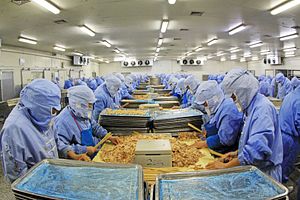Multinational corporations in China have been feeling the pressure of a crackdown on a variety of practices, including alleged monopoly, corruption, and safety issues, in the past year. Chinese probes have been viewed as targeting foreign firms unfairly while providing insufficient legal recourse. With rising wages already pushing multinationals to Southeast Asian nations, including Indonesia, Vietnam, the Philippines and Cambodia, increased regulatory enforcement may only speed up this process.
Many international corporations have now been caught up in the probe. In several high-profile cases, the National Development and Reform Commission and the State Administration for Industry and Commerce have investigated Microsoft and Mercedes-Benz, and looks set to fine Audi and Chrysler for monopolistic pricing. Apple, Microsoft and Symantec products have been banned from sale to government officials. KFC and McDonalds have been caught up in a scandal regarding food safety issues, in which a supplier was exposed for providing rotten meat to the foreign food chains.
The first antitrust enforcement against multinationals occurred in October 2012, as Nike was fined for price fixing. Carrefour was fined in December 2012 for false advertising. In January 2013, the National Development and Reform Commission fined LCD panel manufacturers, including Samsung and LG of Korea. It was reported that the NDRC applied continuous pressure in its investigation of these firms, while allowing the firms to confess to legal violations. The companies ended up complying with the NDRC.
The crackdown on multinational investigations picked up speed last summer. GlaxoSmithKline was investigated on charges of corruption starting in June 2013, while at the same time Mead Johnson Nutrition Co. and Danone were probed for price fixing. Additional firms investigated include Johnson and Johnson (price fixing), Weatherford International (corruption), Avon (corruption), Fonterra (food safety), and Qualcomm (monopolizing the market), among others. Fines may be levied at up to 10 percent of a firm’s annual revenue.
In some cases, the authorities have allegedly told executives not to challenge the investigations or even bring lawyers to meetings. Companies have also been forced to accept punishments without a full legal hearing. Moreover, the violations have not always been clear cut. For example, in the case of Microsoft, industry experts questioned the monopoly charge, as the corporation’s business in China is relatively small.
Foreign direct investment in July was at its lowest level in two years, at $7.8 billion. Although Beijing has denied that this decline in multinational investment was brought on by the recent crackdown, the latter has certainly not improved the business environment for international companies. Some analysts view the recent enforcement of laws against foreign companies as a move toward protectionism or a backlash against U.S. moves to indict Chinese hackers accused of stealing secrets from Westinghouse and U.S. Steel; others assert that China’s punishment of legal violators has included domestic firms (such as China Unicom and China Telecom) as well and has not been intended to single out foreign firms.
However, an uncertain business environment coupled with rising wages have created an unattractive business environment for multinational firms. Already, the trend for foreign firms to move overseas is gathering momentum. As China moves up the value chain, from a focus on low-skilled manufacturing to a focus on high-skilled manufacturing and services, it has become more expensive for manufacturers of low-skilled products to operate in China. As a result, textile manufacturers have moved to Cambodia, while other manufacturing firms, including Foxconn, Samsung, Toyota, and Tata Motors have moved to Indonesia. A scandal-fraught business environment for multinational firms is likely to speed up this process.
If anything can be concluded from all of this, it is clear that multinationals no longer enjoy the preferred status that they did ten or fifteen years ago. Wages are rising, the legal enforcement environment is tougher, licensing procedures have become more difficult, the price of raw materials is rising, transparency is low, and local Chinese businesses are becoming more competitive. Where multinationals will choose to focus their production will depend on whether or not it is, on the whole, too costly to do business in China going forward.
































